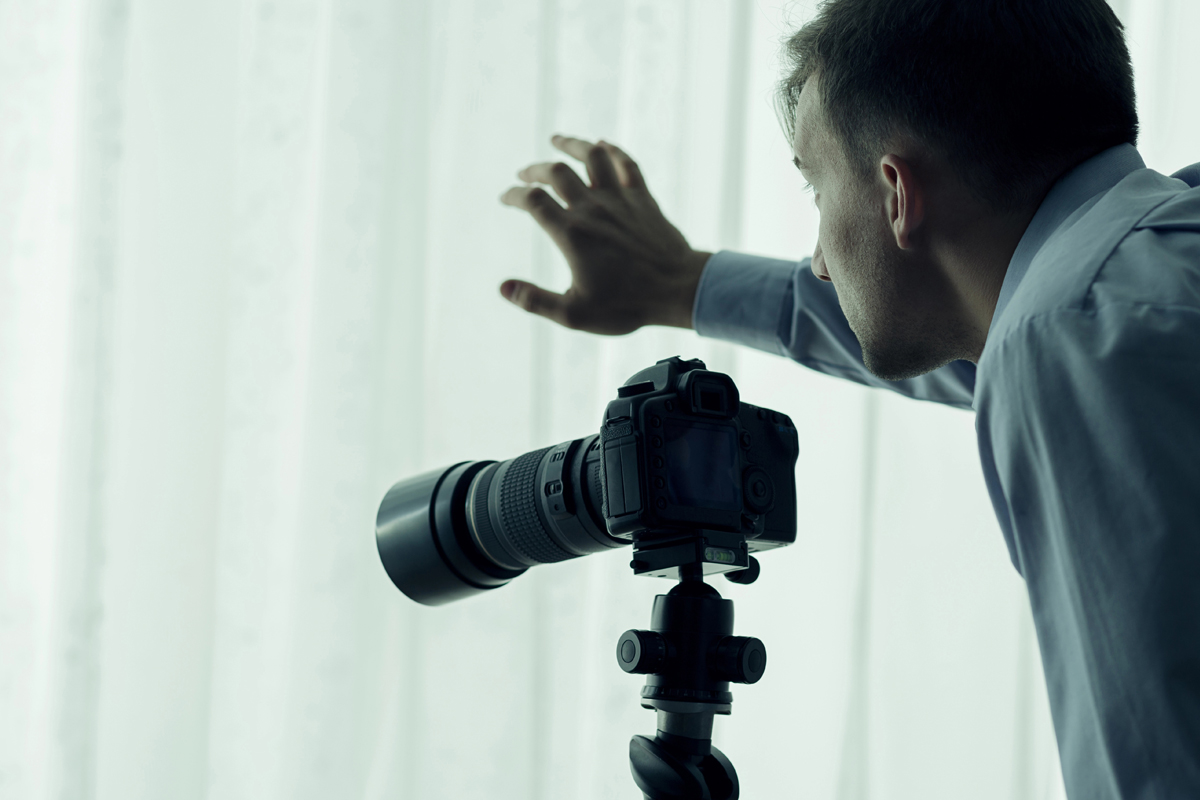If you are facing voyeurism charges, you need a criminal defence lawyer in Calgary to look at your case as soon as possible.
In Canada, voyeurism is a crime that happens when someone secretly watches or records someone else in a private setting without their permission.
The Criminal Code of Canada says that voyeurism is when someone secretly watches or records someone who has a reasonable expectation of privacy, especially when that person is naked, exposing private parts, or having sex.
Voyeurism is a hybrid offence.
- This means it can be charged as either a summary (less serious)
- or indictable (more serious), depending on how serious the case is.
If someone is found guilty of voyeurism as an indictable offence, they could be sentenced to up to five years. If charged as a summary offence, they could go to jail for up to two years, pay a fine, or both.
People who are found guilty of voyeurism may also have to register as sex offenders. For a more detailed overview of the legal process, you can learn about our Court Process in Calgary.
Strategic Criminal Defence is a top Google-rated criminal defence firm in Calgary, with over 600 5-star reviews. Our firm, and our experienced legal team, have defended clients in over 10,000 criminal cases. Leveraging our extensive network of lawyers and decades of experience, we craft defence strategies to help those accused of voyeurism beat the charge.
The lawyers at Strategic Criminal Defence are both highly experienced and dedicated to defending your rights and future in the face of these charges. Contact a Calgary voyeurism lawyer today by calling (403) 719-6410.
Key Takeaways
- Voyeurism is when you secretly watch or record someone in a private setting without their permission.
- It is a serious crime that could have a significant effect on someone’s future and reputation.
- Voyeurism is a crime that can be charged as either a summary or an indictable offence.
- The maximum punishments are up to five years in prison for indictable crimes and up to two years in prison for summary offences.
- Common bail conditions are not being able to talk to the alleged victim, not being able to use certain devices, and not being able to go to certain places.
- With the right legal defence strategies, you can successfully fight these charges.
- Defences could include questioning the right to privacy or asking if the recording was really done in secret.
Understanding Voyeurism Charges in Canada
How Our Lawyers Help With a Voyeurism Charge
Our lawyers can help you with every part of the process.
- We can give you legal advice before you are charged, help you understand what happens after you are charged, and make the best case possible for your defence.
- We will collect useful evidence and find expert witnesses who can assist with your defence. For example, we can obtain digital evidence that could help show that you are not guilty.
- We can also hire expert witnesses, like digital experts, who can look at recording devices or video footage, to support your case.
Examples of Voyeurism Charges
Here are some actions that could get you charged with voyeurism in Calgary:
- Someone puts a camera in a public swimming pool changing room to secretly film people getting undressed. This is against the law because people expect privacy in changing rooms, and it is against the law to record them without their permission for personal use.
- A landlord installs a hidden camera in a tenant’s bathroom to watch them shower. This is voyeurism because the tenant has a clear expectation of privacy in their bathroom, and they are in a place where nudity is expected.
- Someone uses their phone to secretly take photos up a person’s skirt in a shopping mall. Even though this happens in public, the victim has a reasonable expectation that private areas of their body are not being viewed or recorded.
Consequences of a Voyeurism Charge
If you’re charged with voyeurism, you’ll face serious consequences that will affect many parts of your life for a long time.
- Voyeurism is a hybrid offence in Canada. This means that the Crown prosecutor can choose to treat it as an indictable offence (more serious) or a summary offence (less serious), depending on the details of the case. Your punishment will change because of this choice.
- If voyeurism is charged as an indictable offence, the longest prison sentence is five years. If there is more than one victim or other factors that make the crime worse, the sentence is more likely to be closer to the maximum.
- If the crime is treated as a summary offence, the longest time in jail is two years, and/or a $500 fine.
- In addition to these immediate punishments, being found guilty of voyeurism will also give you a criminal record that can make it harder to find work, travel, and volunteer. The Sex Offender Information Registration Act says that people who are found guilty must also register as sex offenders.
Voyeurism Charge Defences
If you’re being accused of voyeurism, it’s important to know what defences you might have. There are a number of legal strategies that might help you fight these serious charges. Our team can help you figure out which of these options might be best for your situation.
Here are some possible ways to defend yourself against voyeurism charges:
- No Reasonable Expectation of Privacy: One of the main arguments against voyeurism charges may be that the person did not have a reasonable expectation of privacy in the situation. For this defence to work, our team needs be able to show that the alleged victim was in a public place where they could reasonably expect other people to see them.
- No Secret Observation or Recording: A big part of a voyeurism offence is that the person being watched or recorded didn’t know about it. Our lawyers might say that the person who was being watched or recorded knew about it and that it was done in public. For instance, if you were holding a camera out in the open and the other person could clearly see that you were recording, this might not be voyeurism.
- No Sexual Purpose: For some voyeurism charges, the prosecution must show that the observation or recording was done for a sexual reason. Your defence might be able to show that any recording or observation had a valid, non-sexual reason. For instance, if you put security cameras on your property to keep it safe and they happened to catch footage of your neighbours, our team could say that there was no sexual motivation.
Should you ever find yourself under police scrutiny, it can be helpful to consult with a Police Investigation Lawyer in Calgary to ensure your rights are protected during the investigation.
Voyeurism Charge Investigation
When the police in Calgary look into claims of voyeurism, they look for evidence of recordings or observations that were made without the person’s knowledge.
- This could include hidden cameras found or someone finding recordings of themselves that weren’t supposed to be made and reporting them to the police.
- The police would then gather any digital devices that could have evidence on them. Such as, cameras, phones, computers, or storage devices. Digital forensic experts could also look at them, including looking for deleted pictures or videos.
- The experts may also look for metadata that tells them when and where recordings were made and how files may have been shared.
- Investigators will also look for hidden cameras, holes in walls, or other ways that people may have watched someone without them knowing. They take pictures of the area to see if the victim had a right to privacy there.
- The police would talk to the person who made the complaint, any possible witnesses, and finally the suspect. They might look at online accounts, search histories, and electronic messages to see what the accused might have been planning. They also check to see if the suspect had a good reason for being where the alleged voyeurism took place.
Bail Conditions for Voyeurism Charges
If someone is charged with voyeurism, they may be able to get out on bail until their court date.
If released, the judge makes special rules called bail conditions that must be followed until the case is finished.
- The person who is accused will usually be told to stay away from the alleged victim, including their home, work, and any other places they go often and not talk to them, either directly or through other people.
- Another possible condition would limit the use of cameras, smartphones, or computers. In some cases, the accused may not be allowed to have any recording devices or may only be able to use the internet under supervision.
- If the person accused of voyeurism did it in a specific place, like a gym, pool, or changing room, they will be ordered not be allowed to go there again.
- The court might make the accused give up their passport so they can’t leave Canada. It’s also a common condition to check in with a bail supervisor or police station on a regular basis. In more serious cases, the judge might put the accused under house arrest or make them wear an electronic monitoring device.
- If you break any bail conditions, you are committing a separate crime called breach of conditions. This can mean being held in jail until your trial.
- These conditions stay in place until the case is over, whether that happens through a trial, a guilty plea, or dropping the charges.
If you breach any of these conditions, it may be wise to speak with one of our Breaching Offence Lawyers in Calgary for advice on your next steps.
These conditions stay in place until the case is over, whether that happens through a trial, a guilty plea, or dropping the charges.
For more information, visit our page on The Bail Hearing Process in Calgary.








